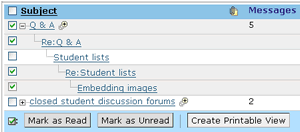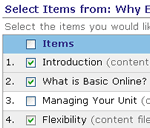Gah, noticed today that I’ve slipped past 200 feeds in Bloglines, 202 now, need to start curbing the habit!
Is this more than most or am I being a bit precious, how many feeds do other people subscribe to?
An ancient edublog
Gah, noticed today that I’ve slipped past 200 feeds in Bloglines, 202 now, need to start curbing the habit!
Is this more than most or am I being a bit precious, how many feeds do other people subscribe to?
Just reread Steve Krause’s When Blogging Goes Bad: A Cautionary Tale About Blogs, Emailing Lists, Discussion, and Interaction and two things sprung to mind.
Firstly this is absolutely critical reading for anyone considering blogging in teaching and learning, it’s a really good examination of blogs not working and that, in my book, is as valuable as 10 papers on why blogging is great. I’d put this on any reading list.
Secondly, Steven’s conclusion that essentially email listservs are a far more effective place for discussion is pretty accurate but what he doesn’t seem to go into is exactly why this is. I’d argue that this is basically down to the fact that email comes simply and ubiquitously to each person whereas the blogs in Steven’s case were very much places that people had to visit, multiple places at that which makes them even less conducive to discussion than typical discussion boards.
Blogs can be like email too though (and much more effective in many ways) through aggregation and I think that had, for example, a combination of the public aggregator facility in Drupal been used alongside individual aggregators like Bloglines then things might have turned out very differently.
Of course, people might not have used them (aggregators are hardly ubiquitous) but had they been used, even in very small numbers, I think that the results of his experiment might have been quite different. Blogging without aggregation is pointless (and I might also say that aggregation without blogging is equally lost…)
Here’s something really rough data-wise so you can roughly estimate the number of live Blogliners… the old incorporated subversion site ceased to be published to in October 2004 at which point it had 128 Bloglines subscribers, since then I’ve been posting ‘no longer at this RSS feed / address’ messages monthly until my Radio subscription runs out (next month I think) . Now the site still has 79 subscribers… I’m guessing that a fair % of those are people who haven’t bothered to unsubscribe to the old feed so, perhaps somewhere in the region of 20 – 40% of bloglines subscriptees in this case are no longer operating. Just a rough guess.
As part of my whole playing with the design I figured that I wanted to add a ‘what’s this’ thing next to my RSS / Atom feeds and mentioned it briefly here.
Well, have given that a bit of a re-write and it now lives next to the ‘subscribe’ tag on the sidebar as a rather odd looking linked question mark (am not sure whether this is clear enough for those new to RSS but hope so). It links to this page which I’m hoping I can refine and play around with until it’s the simplest, most straightforward guide to what RSS is and how you can subscribe to stuff through it, ever.
So, here’s the complete text, what do you think? If anyone has a parent or a some colleagues they could try it out on I’d be hugely appreciative! I just want something that’s short, sweet and straightforward… do you think a diagram would help?
“RSS and Atom allow you to simply subscribe to this weblog to receive new postings in what’s called a ‘news aggregator’.
To do this first you need an aggregator, I’d recommend setting up an account with Bloglines (it’s free and works a treat!) – here are some others.
Then copy and paste the URL of my RSS feed (in this case: “https://incsub.org/wp-rss2.php”) into the appropriate box and click on ‘Subscribe’ (or ‘add’ or whatever looks best).
Now you can check your aggregator the same way you can check email. Each time a new item is posted to this weblog you’ll be able to read it there.
What’s even better is that you can now use the aggregator to subscribe to as many weblogs and news sources as you like… for example if you like this site you will probably like some of the sites I’m currently reading (listed down the right of this blog), they all have RSS or Atom too.
In fact the Guardian has RSS feeds, so does the NY Times and so does the BBC. (these links will tell you more about their feeds)
So when you turn on your aggregator it’s like you’re surfing hundreds of sites to check for new content, all by visiting one place.
So what are ya waiting for, get going… get a bloglines account (1 minute), subscribe to my RSS feed, check out the sites I’m reading, your favourite news sites, subscribe to them and I guarantee you’ll never look back!”
Like Alan I reckon this is a very interesting and worthwhile discussion but while he tears off on a very interesting riff on the value of RSS beyond what is simply ‘new’ I find myself coming back to my main usage of RSS which is to aggregate news sources and in particular my recent ‘Not the WebCT or Blackboard Blog‘ stuff for which I subscribed to a host of RSS searches through various providers.
As with Stephen I used Bloglines, Pubsub & Feedster (& I would have used Technorati had I known that their watchlists are now free) in order to get most recent news results (in this case for two pretty simple searches, ‘blackboard’ and ‘webct’). This was a pretty positive experience as it dug up a heck of a lot of postings that would otherwise never have crossed the radar, especially using a search engine and to be honest I found these to be of real value because they were live, developing and new (which was, in part, a reason why I started it, to demonstrate what webct or blackboard could do if they wanted to).
Now had I run those terms through a search engine I would have got, ahem, 3,860,000 for blackboard and 2,830,000 for WebCT… probably largely unbrowsable, mostly out of date, irrelevant and also, a pain in the arse to look through (with the Google 20 word or so extract). While a more defined search would certainly have brought up more relevant content, in essence I was looking for anything Bb or WebCT related and consequently wouldn’t want to do that.
So on the main issue, Robin Good’s contention that web search feeds are as equally valuable as RSS or news search feeds, I’d have to say I disagree for this kind of function.
Indeed, I’ve also found that subscribing to Google News updates has been an equally fruitless experience, essentially flooding you with airy, poorly written PR fluff about how ‘x and x’ have made $xm and how great everyone is… there’s hardly a world of critical journalism out there in this area I can tell you!
Finally, while subscribing to all those searches was definitely a valuable thing for me to do I wouldn’t recommend it unless you’re able to / want to devote a serious part of your life to it (you get a lot of stuff even on RSS search alone) and think that in the end, I’m much happier using my own, personally designed, human operated, filtered and annotated search engine… the 190-odd blogs I subscribe to which share the good bits, cut the crap out and give me a chance to discuss and think about the stuff in hand.
 Well, having left the searches for a few days there’s a lot of stuff come through, but first up this blog-topic now has a sub-category should you wish to view it separately from incorporated subversion as a whole, here it is.
Well, having left the searches for a few days there’s a lot of stuff come through, but first up this blog-topic now has a sub-category should you wish to view it separately from incorporated subversion as a whole, here it is.
Also, having subscribed to Bloglines, Feedster and Pubsub feeds for “WebCT” and “Blackboard” my aggregator has been chocka so I’ve decided to let go of one. Over the last few days the results have looked like this:
Bloglines: webct 58 blackboard 188
Feedster: webct 38 blackboard 77
Pubsub: webct 12 blackboard 108
So it’s fairly apparent that there are a host of different possible results out there! In the end I’m making a non-scientific call based on content rather than numbers / coverage and dropping Feedster, it seems lie there’s just too much ‘personal diary’ stuff coming through there and while Bloglines picks up a lot of repetition and I’m not sure about the comprehensiveness of pubsub just yet their results have yielded more interesting stuff for me.
Anyway, on to business :o)
-A post from back in December turned up on Bloglines where Matt Judd describes his thinking regarding the Moodle or WebCT debate, what makes this article particularly interesting is it’s link with a previous article written by Judd, Considering the Alternative which starts off:
“This short article summarizes the limitations and drawbacks to using a closed and proprietary content management system like WebCT in conjunction with third-party e-learning tools. Alternative software solutions, as well as the positive social impact of those choices, are considered.”
His weblog is also called “How do you compile?” – not sure if this is linked in to earlier posts but I like it!
-Does anyone want to go to the 4th Annual WebCT European Users conference, it’s in a fantastic location (of course), is offering sessions in Spanish (as they should in bloody Barcelona) and has a heap of uninspiring themes… wonder what interesting papers and ground braking ideas will come out of this one!
-Here’s a hot job, Jnr project manager at WebCT, not a bad package for the specs.
–I disagree David, I think the technology does play a big role!
-Rick West reflects on his experiences in end of term Blackboard land:
“I then tried to email everybody, but all of your emails have been purged from my Blackboard course (which is weird – that’s never happened before. BTW, that’s one reason we did blogs this semester instead of Blackboard discussions, because at the end of the semester, all of the knowledge we’ve accumulated in a Bb discussion is lost and locked away).”
-It’s not all bad though, “Cool WebCT” is something I haven’t heard for a while but here it is!
-Here’s a find: Blackboard Blues “One man’s struggles with the Blackboard Learning Management System”
-And the BlackboardBlog (mostly in Dutch)
Interesting, Read/Write Web shares some Feedburner RSS aggregator stats which I must have missed out on before Christmas:
and the RWW ones too:

So take your number of Bloglines subscribers and multiply by 2 or 3 and…
Am not at all surprised by the Bloglines supremacy, it’s one to watch.
 Well, it would seem fairly clear that despite my best efforts at persuasion ;o), BB and WebCT just don’t wanna go ‘a blogging so welcome to an incorporated subversion sub topic “Not the Blackboard & WebCT Blog”!
Well, it would seem fairly clear that despite my best efforts at persuasion ;o), BB and WebCT just don’t wanna go ‘a blogging so welcome to an incorporated subversion sub topic “Not the Blackboard & WebCT Blog”!
For some reason the pubsubs I set up for our two favourite LMSs haven’t seemed to work (which is a shame as pubsub looks better and better and with Steven Cohen now on board are going to go good places!) However, I’ve created some Bloglines & Feedster searches and am sure it won’t be long before the items come flooding in!
However, that’s not to say that we’re out of things to talk about! In particular Scott Leslie raises some very relevant and worthwhile points in response to my thoughts on the WebCT ‘compile’ tool.
First up there might be a bit of a confusion regarding exactly what the ‘compile’ too does, this unfortunately, is compiled (whoops) by the fact that it no longer exists. Yes, as far as I can see in Vista 3.0 ‘compile’ has been replaced by ‘Create Printable View’ – so I hope you haven’t spent too much time training / building awareness / developing materials! This is however a bonus in some ways as it explains essentially what it does: that is it allow you to select a number of items for example discussion board messages or html pages and create a printable version, like so:
 …
… 
Which is wonderful for sales – imagine the flexibility, the use, the opportunity, the…
But pointless / terrible in reality, because when it comes to reading discussion board messages, who wants to carefully select the messages they want to print without actually reading them (and if they had read them who wants to go back to compiling them, why not print them then and there?) and why are we trying to encourage printable communication anyway?) – I’d wager that this is used 99% of the time as a tool to simply scroll through discussion board postings without clicking on each bloody one… and guess what, to get there you need to ‘Expand All’ the threads, ‘Select All’ the postings, click on ‘Create Printable View’ and then you get the messages in a pop up without visible threading (unless you read all their metadata).
(do you see, perhaps, why I might complain about the overly complex nature of these tools and the fact that you DO need tutorials / training / support to explain how to use them… when they should be easier than email!)
In terms of content then we’re in a similar boat, how often do you imagine learners would like to print, say, a few sections of the study guide… and if this were the case wouldn’t they simply click on ‘print’ once they’d read that particular section? I really don’t think that anyone is creating their own offline virtual textbooks! This is also based on the assumption that all the content is in html and if, like me, you’ve had plenty of opportunity to check out what individual teachers are doing then you guessed it, it’s in .doc, .ppt, .pdf etc. etc. etc. but not in html.
And the bit about being able to compile discussion board postings and content together is a myth too… or at least I can’t figure out how to do it so I don’t hold out much hope for a newbie educator.
Finally Scott asks “can you demonstrate to me within any of the wiki, blog or community software (Drupal, etc) you use an easy way to combine content from disparate sections into one easy printable/offline version?” to which I say that I don’t think it’s necessary. Simply create the content in html (as it has to be here) and then offer it as a complete document and a separate bits if you so choose. Alternatively the ‘book’ function in Drupal certainly allows you to create content that would work like this, but in the end why bother?
Phew, back on the case and just the 1500 or so Bloglines items to get through this morning… thanks to everyone who commented on the festive post, looks like I really needed the break, couldn’t even spell “Christmas” ;o)
I’m with Seb, blogrolls are good. They are simple, visible, physical ways of exploring a network, finding stuff you want to read and seeing what kind of interests the writer has.
After much wringing of hands Bloglines even delivered the blogroll of my dreams, one which is based on my webfeed subscriptions so I don’t even need to update it.
“Save the blogroll”!